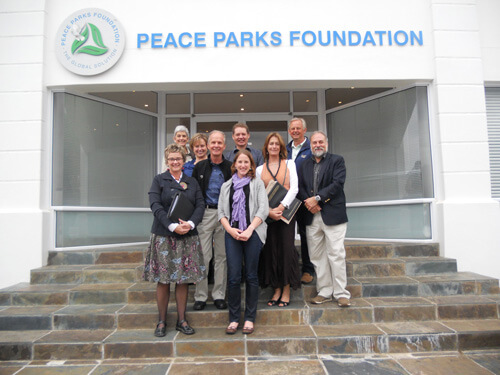Animals, seeds, air and water move freely across landscapes — only humans feel the need to define our landscapes with political boundaries. Transboundary conservation areas, or conservation areas that span these defined political boundaries, are vitally important to ensure that nature survives and thrives. WILD is deeply committed to connectivity and it is a core principle to the vision of Nature Needs Half. Global climate change and ever expanding human development increases the urgency for consciously connecting protected areas.
The Peace Parks Foundation, based just outside of Cape Town, South Africa, is one of the leading organizations world-wide working on transboundary connectivity. WILD serves as the US hub – Friends of the Peace Parks. Our WILD team met with the Peace Parks leadership team to hear about their current priorities and projects.
Peace Parks Foundation has established and now manages 10 transboundary parks throughout Southern Africa. They work with governments, both national/elected and traditional leaders, to establish parks and implement policies to assist with tourism, such as new border crossings for tourists within the parks. They also provide management support for parks with wildlife and tourism colleges, which train individuals work within the parks.
We talked at length about their BIG project – KAZA (Kavango-zambezi). KAZA is “situated in the Okavango and Zambezi river basins where the borders of Angola, Botswana, Namibia, Zambia and Zimbabwe converge. It is set to become the world’s biggest conservation area and will eventually span an area of approximately 287 132 km², almost the size of Italy (300 979 km²). It will include 36 national parks, game reserves, community conservancies and game management areas.”
The Peace Parks team is currently working on community stakeholder engagement with each region within the proposed conservation area, building joint ownership and consensus between communities, tribal groups and government.
I have to say….this is HUGE undertaking and it is very exciting. The implementation of KAZA can provide a lot of structural/process tools for transboundary initiatives around the world and also serve as inspiration for all of us working each day to move conservation forward. Thank you Peace Parks for being a conservation giant for connectivity!

